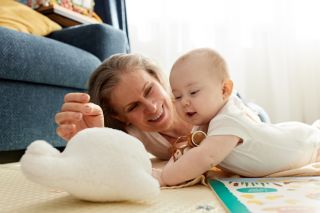
Our recent research with over 1,000 parents indicates that the presence of active grandparents may help to prevent perinatal mood and anxiety disorders (PMADs). More specifically, we found that among birthing parents, only 4 out of 10 with a supportive parent reported experiencing a PMAD, compared to 6 out of 10 among those who did not report having a supportive parent. Having a supportive parent can boost parental confidence, reduce anxiety, and foster a sense of competence in their new roles.
Unfortunately, despite the support that birthing parents found from grandparents, many felt like they did not have enough time or support from them: 63% reported wanting more from their parents. New parents spoke about their own parents’ work schedules and distance being the largest barrier to receiving more support from their parents. For example, one mother shared:
“My mom helped so much during those first few days but she lives 5 hours away and works, and could only get a few days off. It would have been so helpful to have her stay longer to help out with the newborn but also my 4-year-old.”
The Case for Grandparent Leave
The conversation around paid leave needs to extend to other important caregivers in parents’ and children’s lives. This research speaks to the importance of grandparent leave so they can spend time with their own children and grandchildren during the perinatal period. Birthing parents are most likely to develop a PMAD during the first few weeks postpartum and during the period 3-to-6 months postpartum. Allowing grandparents to take caregiving leave during these periods could provide necessary support and potentially a natural intervention for the development of PMADs. This support could be far-reaching, as we know that PMADs can be detrimental to the parent-child attachment relationship both with the infant as well as older children. By supporting parents during this period, grandparents are also supporting the parents, children, and entire family system.
One place to begin could be to learn from grandternity movements popping up in a handful of companies in the United States, like Booking.com and SentinelOne, and shared parental leave policies in other countries, like Sweden. “Grandternity” refers to company policies that allow grandparents to take time off work to support their children and grandchildren. Not only does this leave time help families, but employers are finding that it is helping in retaining workers who otherwise would have considered early retirement to spend time with grandchildren. Sweden’s parental leave policies are among the most generous in the world, allowing parents to share up to 480 days of paid leave, which can also be transferred to grandparents in some circumstances. This flexibility enables grandparents to step in as caregivers, fostering stronger family bonds and ensuring vital support during the early weeks and months of a child’s life. Such policies highlight how inclusive family leave can enhance intergenerational caregiving and improve outcomes for parents, children, and the broader family network.
The Positive Impacts of Grandparents
Research on the positive impacts of a positive grandparent relationship for children is well established. For example, infants benefit from the loving bond and stimulating interactions with grandparents. A study by Mueller and Elder (2003) found that close grandparent-grandchild relationships were associated with fewer emotional and behavioral problems in children. Furthermore, grandparents transmit family history, traditions, and values, contributing to a sense of identity and belonging in their grandchildren (Roberto, 2003). They share stories, experiences, and cultural heritage, creating a link between generations and fostering a deeper understanding of a family’s roots. Grandparents also serve as mentors and role models, offering guidance, advice, and a different perspective on life’s challenges for grandchildren. Support from grandparents may also play a positive role for their grandchildren’s parents during the perinatal period.
Emerging research suggests that grandparent involvement is related to higher levels of parental satisfaction and lower levels of parenting stress. Reim et al. (2023) found that higher levels of support from the maternal grandmother are related to better maternal postpartum mental health in the first year postpartum. This makes sense, given the need for practical help during the transition to parenthood. Grandparents often assist with household chores, meal preparation, and running errands, freeing up parents to focus on their newborn (Dunifon, 2013). Around the world, maternal grandmothers, in particular, play a crucial role in caring for newborns (Aubel, 2021). This support allows for crucial rest, reduces parental fatigue, and can prevent burnout, particularly in the early weeks and months. During the third trimester as well, greater communication and social support from maternal grandmothers has been associated with less depressive symptoms among Latina women (Knorr & Fox, 2023).
Grandparents also offer childcare, providing parents with much-needed breaks or enabling them to return to work. This care can be more affordable and flexible than traditional childcare options, offering peace of mind and financial relief. Moreover, infants benefit from the loving bond and stimulating interactions with their grandparents. Emotional support is another key benefit. Grandparents offer a listening ear, share parenting experiences, and provide encouragement and reassurance to navigate the challenges of early parenthood (Casper & Bianchi, 2002). The absence of support from grandparents may place new caregivers at risk of developing postpartum mood disorders (Razurel & Kaiser, 2015). Encouragingly, caregivers can still experience the psychosocial benefits of grandparents’ emotional support, even if they do not physically live close (Ogawa et al., 2019).
Moving Forward
Grandparents are a vital yet often underutilized resource for supporting new parents and fostering family well-being. Their involvement during the perinatal period has the potential to prevent PMADs, strengthen parental confidence, and nurture the bonds between generations. However, systemic barriers like work schedules and limited leave policies often prevent grandparents from providing the full extent of their support. By advocating for policies like grandparent leave and fostering awareness of their critical role, we can unlock the immense benefits that intergenerational caregiving offers. These efforts will not only support individual families but also contribute to a healthier, more connected society.
